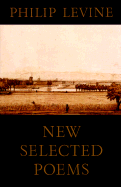“Vivas for those who have failed.”
 Reading Philip Levine’s New Selected Poems isn’t easy when you’re already down. He writes about the same thing in every poem: the loneliness of the universe–conveyed through down-and-out Detroit, which sometimes makes guest appearances in California, Spain or Italy. It is always, however, the same droning voice of failure, with occasional sparkles of hope–dying, naturally, like cigarette embers and machine-shop sparks.
Reading Philip Levine’s New Selected Poems isn’t easy when you’re already down. He writes about the same thing in every poem: the loneliness of the universe–conveyed through down-and-out Detroit, which sometimes makes guest appearances in California, Spain or Italy. It is always, however, the same droning voice of failure, with occasional sparkles of hope–dying, naturally, like cigarette embers and machine-shop sparks.
The thing most worth admiring about Levine, and what sets his poems apart as something more than just a recast of a Hemingway brand of existential depression done in verse–is his daring, almost desperate honesty. In a poem like “Baby Villon” I found myself trying to squirm out of the idea of this auto worker author kissing a male fabrication of all the beautiful suffering in his own life on the lips. At the moment you think the poem is going to turn away it becomes even more intimate, desperate, strange and sad. This, to me, is the mark of someone who–to put it bluntly–is not bullshitting. It is the desperation with which Levine writes that convinces me more than anything.
Because these poems ring with conviction and honesty, Levine’s longer poems work for me much better than most other attempts at long poems I have seen so far. In a poem like “Silent In America,” Levine seems to be driven by an inner force that allows him to maintain the necessary focus and lyric intensity to make this eight-section poem captivating. I find it is not so much that every line seems perfectly wrought, but that the voice of the speaker is profoundly authoritative, even when it is surreal. Perhaps this is because it is not surreal to the speaker, but an accurate rendition of his inner landscape. That is certainly how these poems feel to me–desperate and necessary to his life.
I feel a certain kinship with Levine, and the idea that these poems, if not kept him alive, kept his life somehow a shade removed from the suffering, able to observe and convey it as art. He harkens to Villon, Keats and others as mentors and idols, and seems to be pulling himself out of the grease of the sweatshop and drunken revelries one desperate line at a time. He is part of that tradition of writing when all else fails, including your life, the practice of trying to convey the inner landscape of someone who would probably laugh if you called such a process “art therapy” to their face. Yet it is precisely this sense of not wanting, but needing, to tell it that makes Levine’s poems tick.